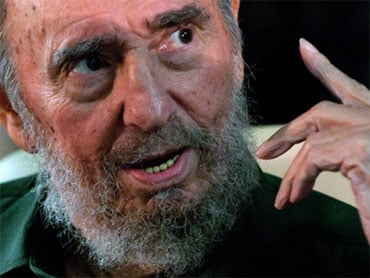
In recent days and weeks Fidel Castro has reappeared everywhere in Cuba—on television, on the radio, in the news—but he has made it, too, into international exchanges again. Ever the clever statesman, he is proving once more that he knows what to say and when to say it to participate in the most relevant international political discussions.
This time, after reading Jeffrey Goldberg’s provocative Atlantic piece on Iran, Israel and the United States, he invited Goldberg to Havana for a good three-day long chat that resulted in what will be several widely-read articles by Goldberg upon his return to the United States (the first one out today, here). Not surprising that he chose Goldberg’s piece: indeed, this topic has been at the top of Fidel’s list of pressing issues for the last few months as he publicly warns that escalation between the United States and Iran could lead to nuclear war and annihilation. Last Friday, Fidel used the spotlight of his first public speech before a mass audience in years to reemphasize this point, and to tell the thousands of Cuban students gathered before the steps of the University of Havana that “the dangerous task of warning the world of the dangers we all face has fallen upon Cuba.”
Goldberg did not miss the opportunity to reflect creatively and usefully on his long hours spent in discussion with the former President Castro. And he shared the image of Fidel as he interpreted it with readers as well (still a rare privilege, though becoming more common as the elder Castro reemerges into the public eye): “His body may be frail, but his mind is acute, his energy level is high, and not only that: the late-stage Fidel Castro turns out to possess something of a self-deprecating sense of humor,” Goldberg writes.
The most striking feature of the new Fidel persona appears to be an unusually apologetic tone. In an interview in late August with the Mexican newspaper La Jornada, he lamented his allowance of the persecution of gays and lesbians in Cuba during the 1960s and 1970s. “If someone is responsible, it’s me,” he told his interviewers, for not paying attention well enough to what was happening in the “re-education camps” individuals were taken to during those years. And in his discussions with Goldberg, when asked—in the context of his current warnings about nuclear war—whether his 1962 letter to Khruschev (suggesting consideration of a nuclear strike against the United States) seemed logical to him now, he responded: “After I’ve seen what I’ve seen, and knowing what I know now, it wasn’t worth it at all.”
The Council on Foreign Relations’ Cuba expert Julia Sweig, who joined Goldberg for his meetings in Havana, interprets all of this as Fidel reinventing himself as a senior statesman on the world stage. Her assessment is reasonable and could be spot-on:
“Matters of war, peace and international security are a central focus. Nuclear proliferation, climate change; these are the major issues for him, and he’s really just getting started, using any potential media platform to communicate his views. He has time on his hands now that he didn’t expect to have. And he’s revisiting history, and revisiting his own history.”
In any case, it’s clear that we’ll continue to see more of Fidel, for as long as that remains possible.
(Photo credit: AP Photo/Cubadebate)